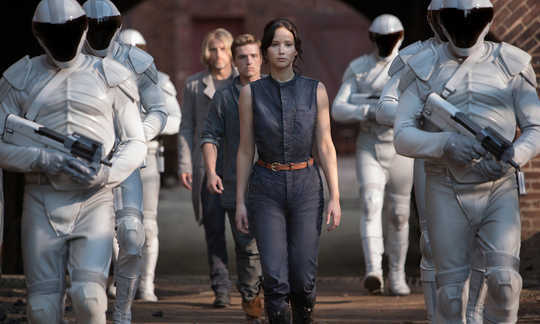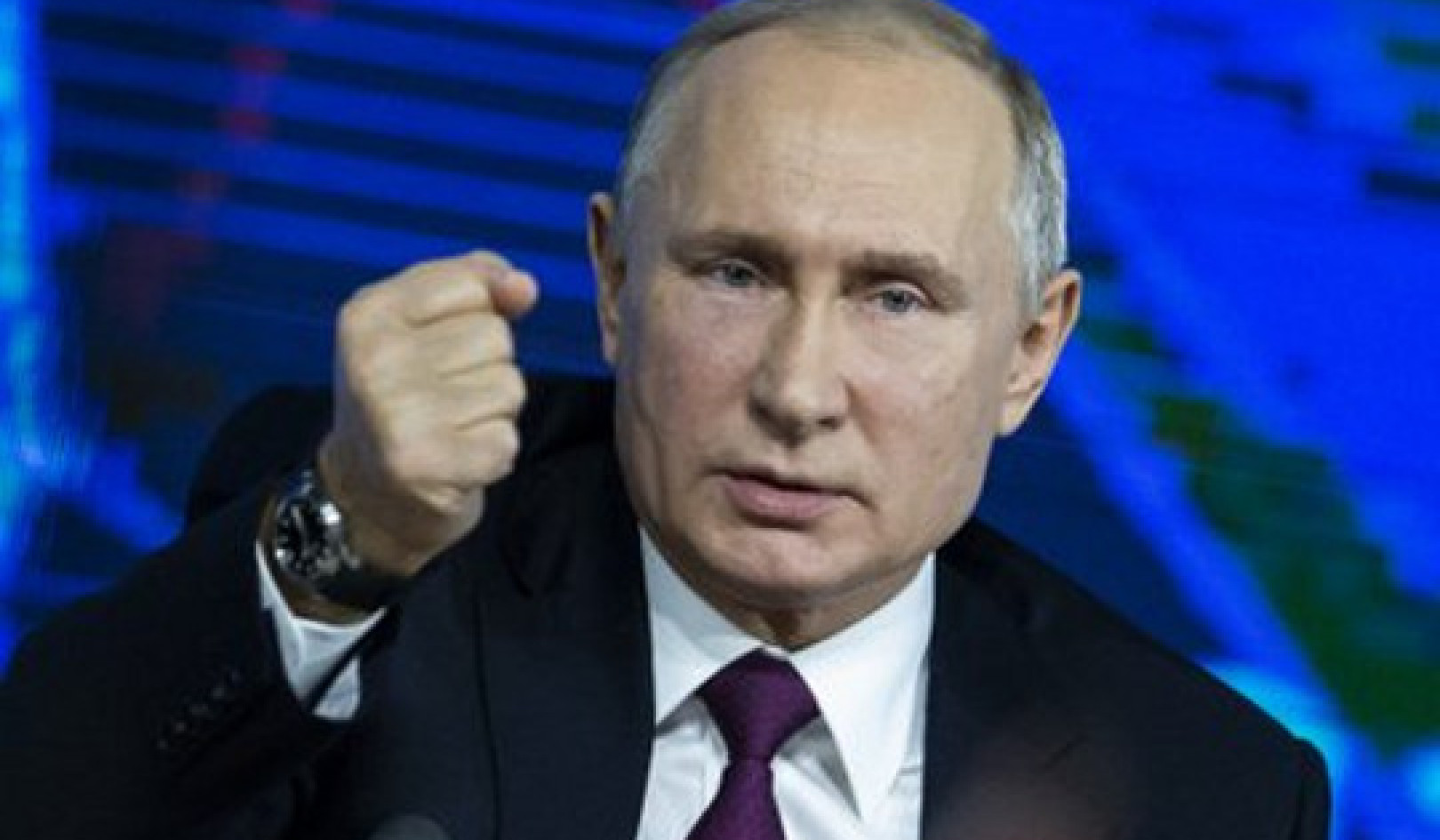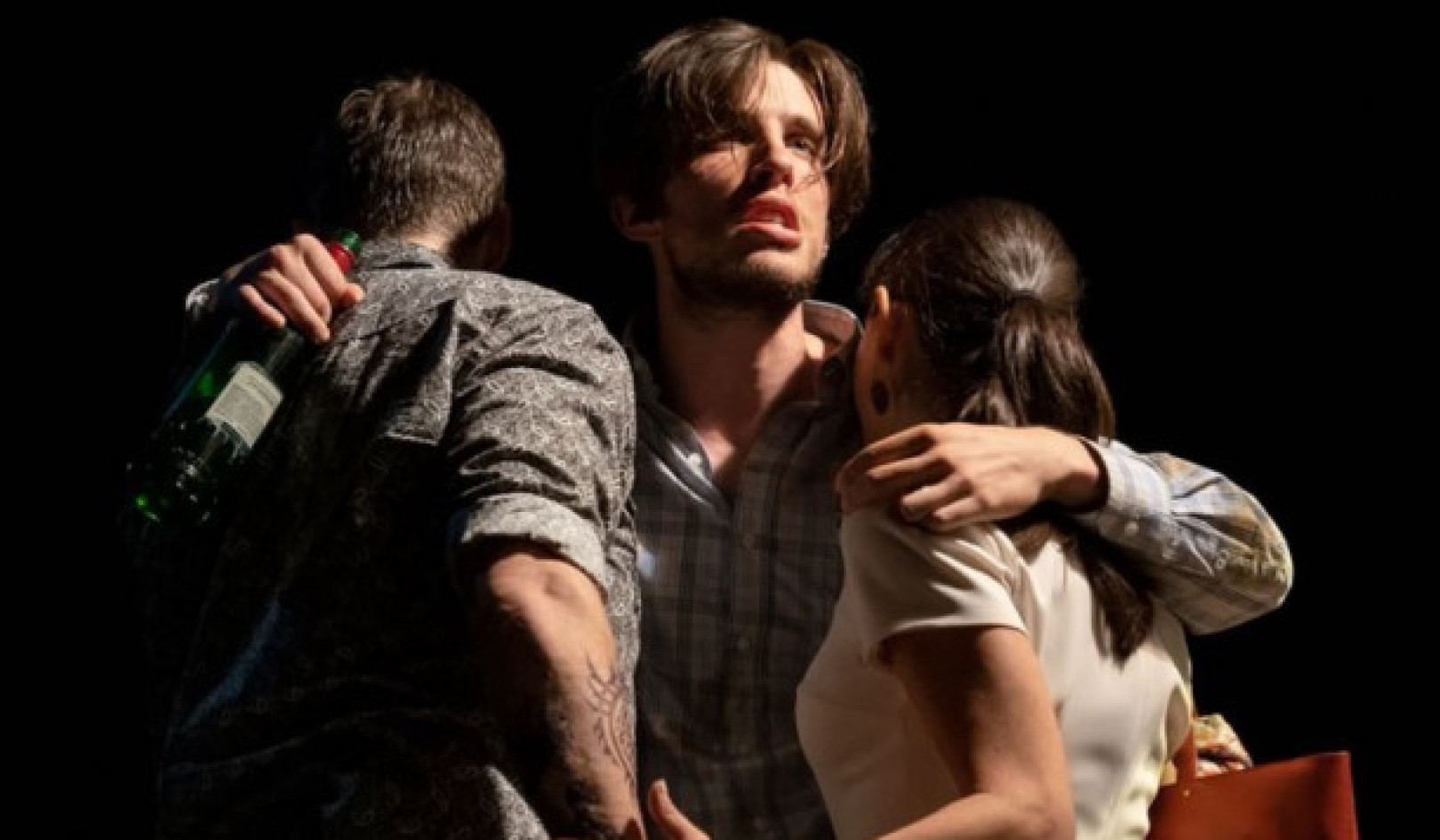
From The Hunger Games (2012). Photo by Murray Close/Lionsgate Films
Humans are storytelling creatures: the stories we tell have profound implications for how we see our role in the world, and dystopian fiction keeps growing in popularity. According to Goodreads.com, an online community that has grown to 90 million readers, the share of books categorised as ‘dystopian’ in 2012 was the highest for more than 50 years. The boom appears to have begun after the terrorist attacks on the United States of 11 September 2001. The share of dystopian stories skyrocketed in 2010 as publishers flocked to capitalise on the success of the Hunger Games novels (2008-10), Suzanne Collins’s gripping trilogy about a totalitarian society ‘in the ruins of a place once known as North America’. What should we make of the fact that dystopian fiction is so popular?
A great deal of ink has been spilled exploring why these narratives are so appealing. But another important question is: So what? Is dystopian fiction likely to affect anyone’s real-world political attitudes? If so, then how? And how much should we care about its impact? In our research, we set out to answer these questions using a series of experiments.
Before we began, we knew many political scientists would likely be skeptical. After all, it seems unlikely that fiction – something known to be ‘made up’ – could be capable of influencing people’s real-world outlooks. Yet a growing body of research shows that there is no ‘strong toggle’ in the brain between fiction and nonfiction. People often incorporate lessons from fictional stories into their beliefs, attitudes and value judgments, sometimes without even being aware that they are doing so.
Dystopian fiction, moreover, is likely to be especially powerful because it is inherently political. We focus here on the totalitarian-dystopian genre, which portrays a dark and disturbing alternative world where powerful entities act to oppress and control citizens, violating fundamental values as a matter of course. (While post-apocalyptic narratives, including those about zombies, can also be considered ‘dystopian’, the standard setting is politically very different, emphasising chaos and the collapse of social order, and thus is likely to affect people in different ways.)
Certainly, individual totalitarian-dystopian storylines vary. To give a few popular examples, torture and surveillance feature in George Orwell’s 1984 (1949); organ harvesting in the Unwind series (2007-) by Neal Shusterman; mandatory plastic surgery in the Uglies series (2005-7) by Scott Westerfeld; mind control in Lois Lowry’s The Giver (1993); gender inequality in Margaret Atwood’s The Handmaid’s Tale (1985); government-arranged marriage in the Matched trilogy (2010-12) by Ally Condie; and environmental disaster in the Maze Runner series (2009-16) by James Dashner. But all such narratives conform to genre conventions of character, setting and plot. As observed by Carrie Hintz and Elaine Ostry, the editors of Utopian and Dystopian Writing for Young Children and Adults (2003), in these societies ‘the ideals for improvement have gone tragically amok’. While there are occasional exceptions, dystopian fiction typically valorises dramatic and often violent rebellion by a courageous few.
To test the impact of dystopian fiction on political attitudes, we randomly assigned subjects from a sample of American adults to one of three groups. The first group read an excerpt from The Hunger Games and then watched scenes from the 2012 movie adaptation. The second group did the same, except with a different dystopian series – Veronica Roth’s Divergent (2011-18). It features a futuristic US in which society has split into factions dedicated to distinct values; those whose capabilities cross faction lines are viewed as a threat. In the third group – the no-media control group – subjects were not exposed to any dystopian fiction prior to answering questions about their social and political attitudes.
What we found was striking. Even though they were fictional, the dystopian narratives affected subjects in a profound way, recalibrating their moral compasses. Compared with the no-media control group, subjects exposed to the fiction were 8 percentage points more likely to say that radical acts such as violent protest and armed rebellion could be justifiable. They also agreed more readily that violence is sometimes necessary to achieve justice (a similar increase of about 8 percentage points).
Why might dystopian fiction have these startling effects? Perhaps a simple priming mechanism was at work. The violent action scenes could easily have triggered excitement in a way that made our subjects more willing to justify political violence. Violent video games, for instance, can heighten aggressive cognitions, and dystopian fiction often contains violent imagery with rebels fighting against the powers that be.
To test this hypothesis, we conducted a second experiment, again with three groups, and this time with a sample of college students around the US. The first group was exposed to The Hunger Games and, as before, we included a second, no-media control group. The third group, however, was exposed to violent scenes from the Fast and Furious movie franchise (2001-), similar in length and type to the violence in the Hunger Games excerpts.
Once again, dystopian fiction shaped people’s ethical judgments. It heightened their willingness to justify radical political action compared with the no-media controls, and the increases were similar in magnitude to what we found in the first experiment. But the equally violent and high-adrenaline action scenes from Fast and Furious had no such effect. So violent imagery alone could not explain our findings.
Our third experiment explored whether a key ingredient was the narrative itself – that is, a story about brave citizens contending with an unjust government, whether fictional or nonfictional. So this time, our third group read and watched media segments about a real-world protest against corrupt Thai government practices. Clips from CNN, BBC and other news sources showed government forces in riot gear using violent tactics such as tear gas and water cannons to suppress masses of citizens protesting injustice.
Despite being real, these images had little effect on subjects. Those in the third group were no more willing to justify political violence than the no-media controls. But those exposed to the Hunger Games dystopian-fiction narrative were significantly more willing to see radical and violent political acts as legitimate, compared with those exposed to the real-world news story. (The difference was about 7-8 percentage points, comparable with the two previous experiments.) Overall, then, it appears that people might be more inclined to draw ‘political life lessons’ from a narrative about an imaginary political world than from fact-based reporting about the real world.
Does this mean that dystopian fiction is a threat to democracy and political stability? Not necessarily, although the fact that it is sometimes censored suggests that some leaders do think along these lines. For example, Orwell’s Animal Farm (1945) is still banned in North Korea, and even in the US, the top 10 books most frequently targeted for removal from school libraries in the past decade include The Hunger Games and Aldous Huxley’s Brave New World (1931). Dystopian narratives offer the lesson that radical political action can be a legitimate response to perceived injustice. However, the lessons people take away from media, be it fiction or nonfiction, might not always stick and, even when they do stick, people don’t necessarily act on them.
Dystopian fiction continues to offer a powerful lens through which people view the ethics of politics and power. Such narratives might have a positive effect in keeping citizens alert to the possibility of injustice in a variety of contexts, ranging from climate change and artificial intelligence to authoritarian resurgences worldwide. But a proliferation of dystopian narratives might also encourage radical, Manichaean perspectives that oversimplify real and complex sources of political disagreement. So while the totalitarian-dystopian craze might nourish society’s ‘watchdog’ role in holding power to account, it can also fasttrack some to violent political rhetoric – and even action – as opposed to the civil and fact-based debate and compromise necessary for democracy to thrive.![]()
About The Author
Calvert Jones is an assistant professor in the Department of Government and Politics at the University of Maryland. She is the author of Bedouins into Bourgeois: Remaking Citizens for Globalization (2017).
Celia Paris is a leadership development coach at the University of Chicago Booth School of Business. She lives in Chicago, Illinois.
This article was originally published at Aeon and has been republished under Creative Commons.

Related Books:
On Tyranny: Twenty Lessons from the Twentieth Century
by Timothy Snyder
This book offers lessons from history for preserving and defending democracy, including the importance of institutions, the role of individual citizens, and the dangers of authoritarianism.
Click for more info or to order
Our Time Is Now: Power, Purpose, and the Fight for a Fair America
by Stacey Abrams
The author, a politician and activist, shares her vision for a more inclusive and just democracy and offers practical strategies for political engagement and voter mobilization.
Click for more info or to order
How Democracies Die
by Steven Levitsky and Daniel Ziblatt
This book examines the warning signs and causes of democratic breakdown, drawing on case studies from around the world to offer insights into how to safeguard democracy.
Click for more info or to order
The People, No: A Brief History of Anti-Populism
by Thomas Frank
The author offers a history of populist movements in the United States and critiques the "anti-populist" ideology that he argues has stifled democratic reform and progress.
Click for more info or to order
Democracy in One Book or Less: How It Works, Why It Doesn't, and Why Fixing It Is Easier Than You Think
by David Litt
This book offers an overview of democracy, including its strengths and weaknesses, and proposes reforms to make the system more responsive and accountable.
























